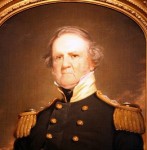Who First Said, "Great Scott!"? And Who Is Scott?
I’m back to inviting readers to submit quotations whose origins they want me to try to trace, using my book, The Yale Book of Quotations, and my more recent researches.
Bill asked:
“Great Scott!
As in, I’d love to know the origin of the phrase made famous most recently by Christopher Lloyd’s zany character in the Back to the Future series, but also used with some frequency much earlier by Hank Morgan, Mark Twain’s own Connecticut Yankee.”
Garson O’Toole, creator of the fantastic quoteinvestigator.com site, has found the earliest known example of the exclamation “Great Scott!” in The Eclectic Medical Journal, December 1856:
“Oh! Moses! Let no man hereafter presume to say Ex-Prof. Buchanan has not taught, and does not teach, practical Eclecticism. He informs you, Eclectics, that these conditions are of great physiological value, ‘as they are highly applicable to the treatment of disease.’ He tells you the aquatic, or cold blooded condition, is valuable as an antiphlogistic agent, and that it soothes and tranquilizes the lungs. ‘Great Scott!’ Mystery upon mystery, and marvel upon marvel! Will day ever dawn? What does our author mean? The writer is again unexpectedly surrounded by the eternal fogs of our author’s brilliant scientific discoveries, and by the brilliancy of his elocution!”
 Photo: cliff1066
Photo: cliff1066The above does not give any clues as to who is the “Scott” referred to in the expression. Word-sleuth extraordinaire Barry Popik found important evidence in a book by John William De Forest, Miss Ravenel’s Conversion From Secession to Loyalty (1867):
“I follow General Scott. No Virginian need be ashamed to follow old Fuss and Feathers. We used to swear by him in the army. Great Scott! the fellows said.”
The reference is to General Winfield Scott, who commanded one of the two American armies in the Mexican War and was the Union general-in-chief at the beginning of the Civil War. This and other evidence, although not conclusive, points strongly to Winfield Scott as the source of “Great Scott!”
Do any readers have any other quotations whose origins they would like me to attempt to trace?

Comments